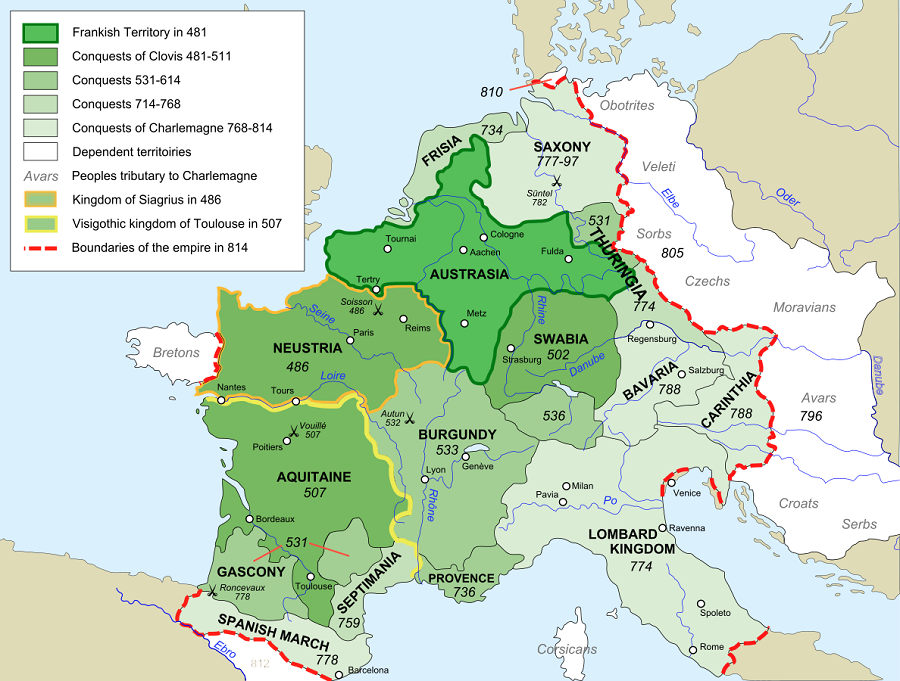At the moment when, in his place before the altar, he was bowing down to pray, Pope Leo placed on his head a crown, and all the Roman people shouted.
Continuing Charlemagne,
our selection from A Popular History of France from the EarliestTimes, Volume 1 by François P.G. Guizot published in 1869. For works benefiting from the latest research see the “More information” section at the bottom of these pages. The selection is presented in fourteen easy 5 minute installments.
Previously in Charlemagne.
Time: December 25, 800
Place: St. Peter’s Basilica, Rome

CC BY-SA 3.0 image from Wikipedia
Eginhard adds, in his Life of Charlemagne: “The King at first testified great aversion for this dignity, for he declared that, notwithstanding the importance of the festival, he would not on that day have entered the church if he could have foreseen the intentions of the sovereign Pontiff. However, this event excited the jealousy of the Roman emperors (of Constantinople), who showed great vexation at it; but Charles met their bad graces with nothing but great patience, and thanks to this magnanimity which raised him so far above them, he managed, by sending to them frequent embassies and giving them in his letters the name of brother, to triumph over their conceit.”
No one, probably, believed, in the ninth century, and no one, assuredly, will nowadays believe that Charlemagne was innocent beforehand of what took place on the 25th of December, 800, in the basilica of St. Peter. It is doubtful, also, if he were seriously concerned about the ill-temper of the emperors of the East. He had wit enough to understand the value which always remains attached to old traditions, and he might have taken some pains to secure their countenance to his title of emperor; but all his contemporaries believed, and he also undoubtedly believed, that he had on that day really won and set up again the Roman Empire.
What, then, was the government of this empire of which Charlemagne was proud to assume the old title? How did this German warrior govern that vast dominion which, thanks to his conquests, extended from the Elbe to the Ebro, from the North Sea to the Mediterranean; which comprised nearly all Germany, Belgium, France, Switzerland, and the north of Italy and of Spain, and which, sooth to say, was still, when Charlemagne caused himself to be made emperor, scarce more than the hunting-ground and the battle-field of all the swarms of barbarians who tried to settle on the ruins of the Roman world they had invaded and broken to pieces? The government of Charlemagne in the midst of this chaos is the striking, complicated, and transitory fact which is now to be passed in review.
A word of warning must be first of all given touching this word government with which it is impossible to dispense. For a long time past the word has entailed ideas of national unity, general organization, and regular and efficient power. There has been no lack of revolutions which have changed dynasties and the principles and forms of the supreme power in the State; but they have always left existing, under different names, the practical machinery whereby the supreme power makes itself felt and exercises its various functions over the whole country. Open the Almanac, whether it be called the Imperial, the Royal, or the National, and you will find there always the working system of the government of France; all the powers and their agents, from the lowest to the highest, are there indicated and classed according to their prerogatives and relations. Nor have we there a mere empty nomenclature, a phantom of theory; things go on actually as they are described — the book is the reflex of the reality. It were easy to construct, for the empire of Charlemagne, a similar list of officers; there might be set down in it dukes, counts, vicars, centeniers, and sheriffs (scabini), and they might be distributed, in regular gradation, over the whole territory; but it would be one huge lie, for most frequently, in the majority of places, these magistracies were utterly powerless and themselves in complete disorder. The efforts of Charlemagne, either to establish them on a firm footing or to make them act with regularity, were continual but unavailing. In spite of the fixity of his purpose and the energy of his action the disorder around him was measureless and insurmountable. He might check it for a moment at one point; but the evil existed wherever his terrible will did not reach, and wherever it did the evil broke out again as soon as it had been withdrawn. How could it be otherwise?
| <—Previous | Master List | Next—> |
More information here and here, and below.
 |
We want to take this site to the next level but we need money to do that. Please contribute directly by signing up at https://www.patreon.com/history
Leave a Reply
You must be logged in to post a comment.